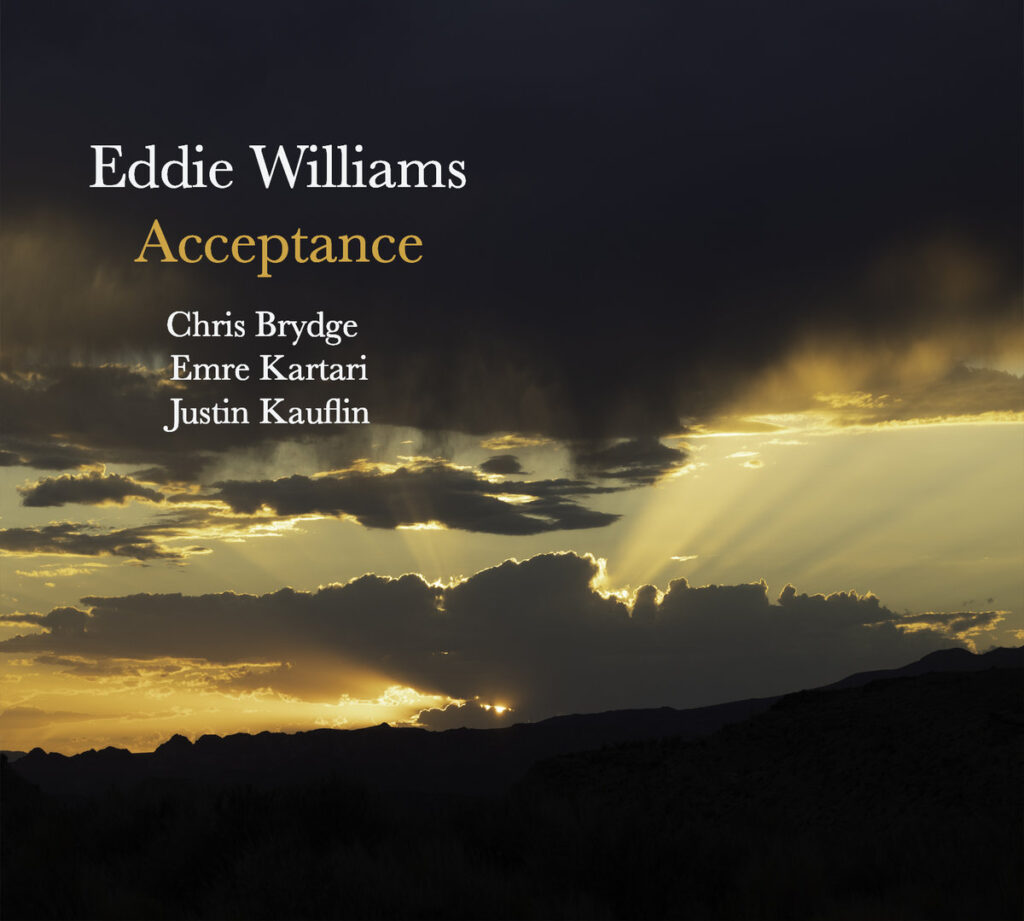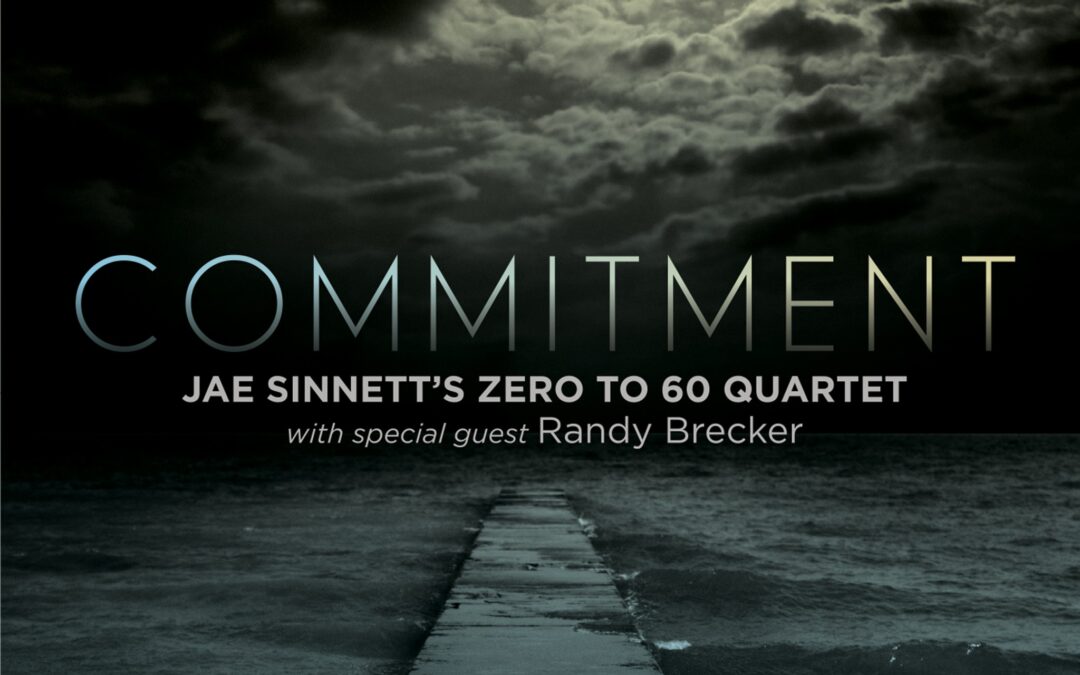By Tom Robotham
Hampton Roads has long been home to some first-rate jazz musicians, and I can think of no better evidence of this fact than the superb quality of two recently released albums by musicians who live here: Commitment, featuring drummer-composer Jae Sinnett and his Zero to 60 Quartet, with special guest Randy Brecker, and Acceptance, saxophonist Eddie Williams’ latest project, which also features a stellar ensemble.
Sinnett is the better-known of the two, in part because of his 34-year run as host of Sinnett in Session, a jazz show on WHRV-FM (89.5.). Indeed, because of that achievement alone, Commitment is a supremely appropriate name for his latest record. Every week on the show (which airs Monday through Thursday evenings as well as Sunday afternoon) Sinnett demonstrates his unwavering passion for jazz, not to mention his deep knowledge of its history and his ability to explain musical concepts to a general audience. All the while, he has sustained a career as a musician who is widely respected nationally. The most recent example of this is Commitment’s rise to number 3 last month on the Jazz Week Radio chart, which tracks radio play across the country. That he is also an accomplished chef and a dedicated music educator often makes me wonder where he finds the time and energy.
The energy is certainly evident on Commitment, and right out of the gate. The opening track, “Takin’ it There,” is a vigorously swinging Sinnett original in the hard-bop tradition—one that features blazing solos by saxman Steve Wilson and pianist Allen Farnham as well as remarkably graceful melodic interplay between Wilson and Brecker on trumpet.
Sinnett wrote two other original compositions for the album—“Muhammara’s Dance,” and “Guise,”—while Farnham penned two: “Wait for Me” and “Be it as it May.” The other five tracks on the record are arrangements of jazz standards representing a range of styles, from the romantic yearning of the well-known ballad “Skylark,” enhanced by Brecker’s beautiful flugelhorn, to the Afro-Cuban “Morning,” and “No More Blues,” a bossa nova tune by the beloved Brazilian composer Antonio Carlos Jobim. The original title of the latter was “Chega de Saudade,” which literally means “no more yearning,” and this spirit is reflected in the joyful playing here. Jae explained to me that they chose to play it as a Partido Alto, another of Brazil’s highly sophisticated rhythmic concepts. Technicalities aside, it’s simply exhilarating—the kind of music you want playing on the car stereo while driving down a beach road in a convertible.
A few things occur to me as I reflect on the album as a whole. One is that the originals are testaments to the fact that jazz still offers unlimited possibilities for melodic, harmonic and rhythmic invention, even though it’s been around for more than a century. Second, the fresh arrangements of the standards are proof that tunes that have been recorded by many other musicians never lose their vitality so long as they’re put into the hands of great artists.
Yet another thing that comes to mind is that this album perfectly balances two essential qualities of jazz: the creation of space for individual expression, and the demand for group cooperation—the necessity of listening to each other and responding in kind.
Above all, the album swings. Sinnett often talks about the importance of swing as an essential quality of jazz—the rhythmic feel that is difficult to define in non-technical terms, but something everyone recognizes when they hear it. I’ve heard a lot of new jazz records that lack this quality—music that is intellectually sophisticated but lacking in soul. Commitment offers a deeply refreshing contrast to those sorts of recordings. Musically, it is very sophisticated, and the playing is virtuosic throughout. But equally important is that it clearly came from the heart.

Acceptance swings hard from the outset as well, with a high-intensity performance of “Barracudas,” a Gil Evans/Miles Davis composition (originally titled “Time of the Barracudas”) that conveys an air of mystery. The original was recorded in 1963 for a much larger ensemble, but this stripped-down version works extremely well in the hands of the musicians Williams assembled for this project—pianist Justin Kauflin, bassist Chris Brydge and drummer Emre Kartari. I love the way it opens with a short staccato phrase played by Brydge alone, which is then repeated as Kauflin and Kartari join in, and repeated again as Williams layers on his sax. Picking up the pace about a minute in, Kauflin shines with a solo that showcases both his stunning technique and his artistic sensitivity. The spotlight then turns to Williams who further intensifies the track with a sax solo that has a sense of urgency, tempered by his beautiful tone.
The album features several other classic jazz tunes, including Billy Strayhorn’s “A Flower is a Lovesome Thing,” which has been recorded by a wide range of instrumentalists and vocalists, most notably Johnny Hodges and Ella Fitzgerald with the Duke Ellington orchestra. It is almost always played as a slow ballad, so I was somewhat surprised by Williams’ decision to speed up the tempo. When I asked him about it, he told me he’s always love the tune—especially the Yellowjackets’ version—but “wanted to try to put a new spin on it and ended up with a kind of drone beneath the ‘A’ section of the melody,” which stands in contrast to the “more swinging bridge section.”
Balancing out the arrangements of standards are three originals by Williams: the title track, which is reprised at the end of the album; “Couples Only,” and “12:58 to Lima.” I especially like “Couples Only,” a fine example of the evergreen quality of straight-ahead jazz accentuated by fresh-sounding instrumental flourishes.
As a whole, the album takes on a variety of moods and styles, but the quartet remains impressively tight throughout. Indeed, you’d never guess that this is Williams’ first time recording with Kauflin and Kartari. The session makes it sound as if this ensemble had been playing together for years.
In short, I highly recommend both of these albums, whether you’re a serious aficionado or a casual jazz listener. They’re available on various music-streaming services, or you can purchase hard copies. To buy Acceptance, go to eddiewilliams.bandcamp.com. Autographed copies of Commitment are available directly from Jae via PayPal at [email protected]. Both albums are also available at Birdland Records in Virginia Beach.




